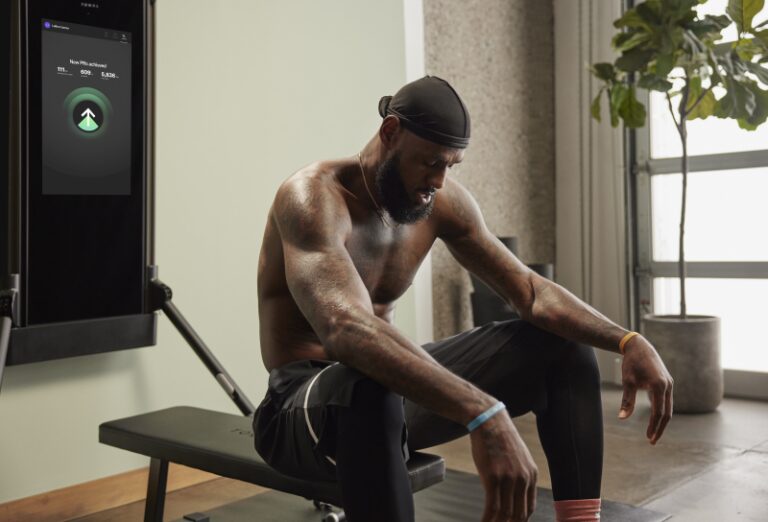Recovery in sports, especially at the elite level, is a critical component of an athlete’s routine. LeBron James, one of the most celebrated athletes in basketball, is a prime example of this.
His rigorous recovery regimen is as important as his training. Today, we explore eight key recovery strategies inspired by LeBron’s routine, offering insights for anyone looking to improve their healing process.
Table of Contents
Toggle1. Prioritize Sleep for Optimal Recovery
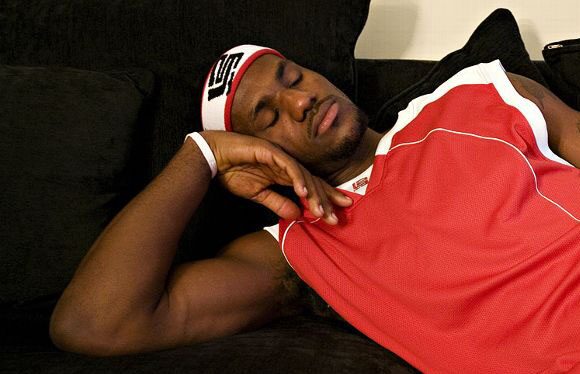
Sleep is the cornerstone of recovery. LeBron reportedly sleeps around 12 hours per night, emphasizing its importance. Quality sleep enhances muscle recovery, cognitive functions, and overall health. It’s during deep sleep that the body repairs muscles and tissues, consolidates memory, and releases growth hormones.
Creating a Sleep-Optimized Environment
To emulate LeBron’s sleep routine, focus on creating an environment conducive to rest. This includes maintaining a cool, dark, and quiet bedroom. Invest in a comfortable mattress and pillows.
Avoid blue light from screens before bed and establish a regular sleep schedule. These steps can significantly improve the quality of your sleep and, consequently, your recovery.
2. Cryotherapy
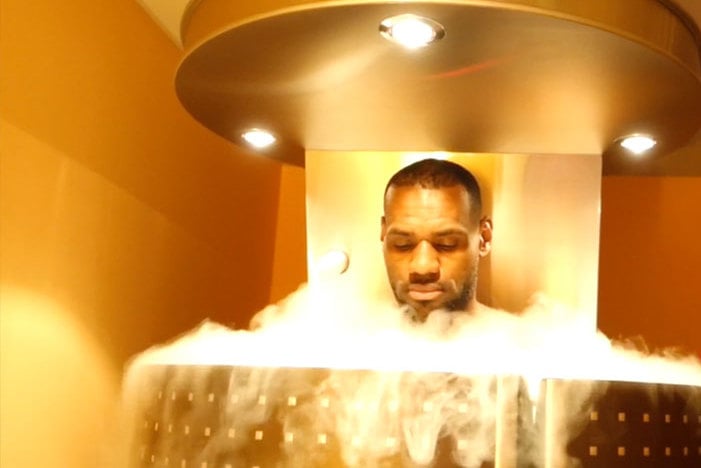
LeBron often uses cryotherapy as part of his recovery. This involves exposure to extremely cold temperatures for a short duration. Cryotherapy reduces inflammation, muscle soreness, and promotes faster recovery.
Integrating Cryotherapy
For those looking to incorporate cryotherapy, it’s available at many sports facilities. Alternatively, taking ice baths or cold showers can offer similar benefits. It’s important to consult with a healthcare professional before starting cryotherapy, especially if you have underlying health conditions.
For those interested in exploring additional recovery methods beyond cryotherapy, hyperbaric oxygen therapy is another option to consider. You can learn more about hyperbaric oxygen therapy and its benefits for recovery and overall wellness at oxyhelp.com.
3. Nutrition: Fueling for Recovery
Nutrition plays a vital role in recovery. LeBron’s diet is carefully curated to provide the right balance of proteins, carbohydrates, and fats.
Protein aids in muscle repair, carbohydrates replenish energy stores, and fats are essential for hormonal functions. Hydration is also crucial for muscle recovery and overall bodily functions.
Personalizing Your Nutrition Plan
Just as LeBron has a personalized nutrition plan, it’s important to tailor your diet to your specific needs. Consulting with a nutritionist can help.
Focus on whole foods, and incorporate a variety of fruits, vegetables, lean proteins, and whole grains. Timing of meals is also key, particularly consuming protein and carbohydrates post-workout to aid muscle recovery.
4. Hydration: The Essence of Recovery
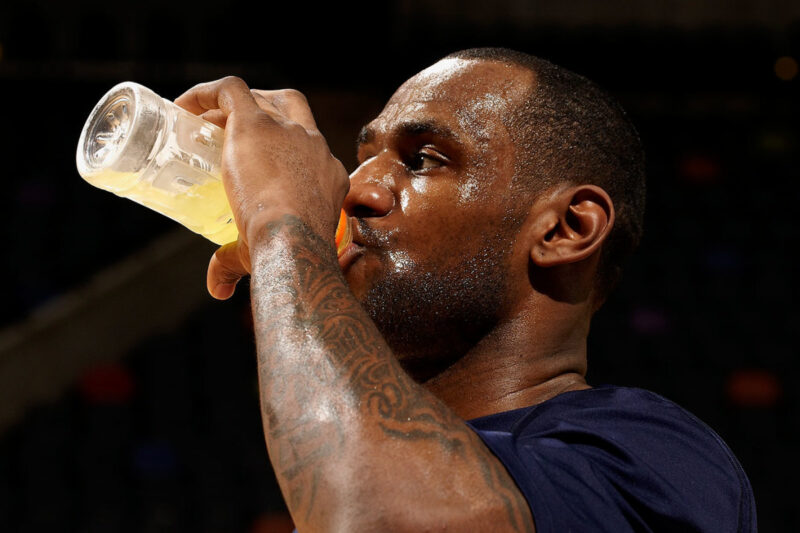
LeBron emphasizes the importance of staying hydrated. Proper hydration aids in every aspect of recovery, from maintaining joint lubrication to facilitating nutrient transport. Water regulates body temperature, which is essential during intense physical activity.
Hydration Strategies
To stay hydrated like an elite athlete, carry a water bottle throughout the day. Don’t wait until you’re thirsty to drink; thirst is a sign you’re already dehydrated. Besides water, incorporating electrolyte-rich drinks can be beneficial, especially post-workout. Monitoring the color of your urine is a practical way to gauge your hydration level.
5. Active Recovery: Keeping the Body in Motion
Active recovery is a staple in LeBron’s routine. This involves engaging in low-intensity exercise during rest days. Activities like yoga, swimming, or light jogging help maintain blood flow, promoting nutrient and oxygen delivery to muscles.
Implementing Active Recovery
Incorporating active recovery into your routine can accelerate healing. The key is to engage in low-impact activities that stimulate blood flow without causing strain. This approach aids in muscle repair and reduces stiffness, preparing your body for the next intense workout.
6. Regular Massage Therapy
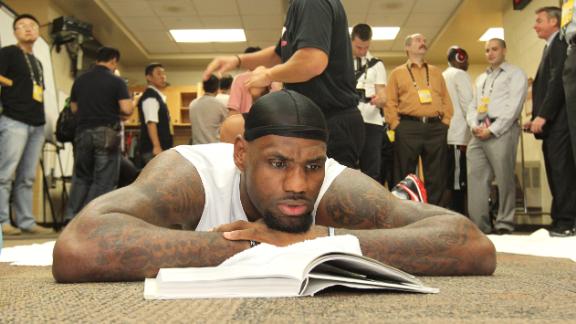
Massage therapy is another component of LeBron’s recovery process. Regular massage helps in alleviating muscle tightness, improving circulation, and reducing stress. It also aids in injury prevention by keeping muscles flexible.
Incorporating Massage into Your Routine
While professional massage may not be accessible to everyone, alternatives include using foam rollers or massage guns. These tools can help in self-myofascial release, improving flexibility and decreasing muscle soreness. Aim for a massage routine post-workout or during rest days.
7. Mental Health: A Key to Physical Recovery
LeBron recognizes that mental health is just as important as physical health in recovery. Stress and anxiety can hinder the body’s healing process. Maintaining a positive mindset and mental resilience is crucial for recovery and overall performance.
Strategies for Mental Wellness
To support mental health, consider practices like meditation, mindfulness, or talking to a mental health professional. Engaging in hobbies and spending time with loved ones can also improve mental well-being. Remember, taking care of your mental health is as important as taking care of your physical health.
8. Consistency and Discipline in Recovery
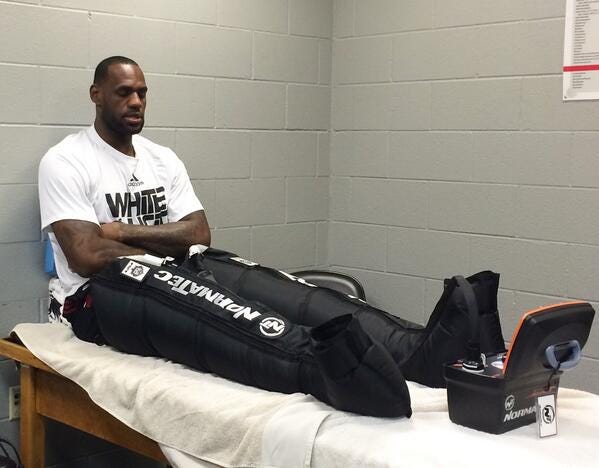
Consistency is key in LeBron’s recovery process. Adhering to a strict routine ensures that all aspects of his recovery are addressed daily. This discipline in recovery is as important as discipline in training.
Developing Your Recovery Routine
To benefit from a recovery routine, it should be as regular as your workout regimen. Set aside time each day for recovery activities, whether it’s stretching, hydration, or sleep. Consistency in these practices will lead to better overall performance and well-being.
FAQs
Can LeBron’s recovery techniques be applied by amateur athletes or beginners?
Yes, many of LeBron’s recovery techniques, like prioritizing sleep and proper nutrition, are universally applicable and beneficial for athletes at all levels, including amateurs and beginners.
How often should one incorporate active recovery into their routine?
Active recovery should ideally be incorporated 1-2 times per week, depending on the intensity of your regular workout routine and your body’s response.
Is it necessary to sleep as many hours as LeBron for effective recovery?
While LeBron sleeps around 12 hours, the key is to get quality sleep. For most people, 7-9 hours of good sleep is recommended for effective recovery.
Are there specific foods that are particularly good for recovery?
Foods rich in protein, like chicken, fish, or legumes, and carbohydrates such as whole grains and fruits, are great for recovery. Anti-inflammatory foods like berries, nuts, and leafy greens also aid in recovery.
Can mental health exercises improve physical performance?
Yes, mental health exercises like meditation can reduce stress and improve focus, indirectly enhancing physical performance and recovery.
Is cryotherapy safe for everyone?
Cryotherapy can be safe for many people, but it’s not suitable for everyone. Those with conditions like hypertension or cardiovascular issues should consult a healthcare professional before trying cryotherapy.
Final Words
Recovery is an essential aspect of any fitness regime, and LeBron James’ approach offers valuable insights. By prioritizing sleep, nutrition, hydration, active recovery, massage therapy, cryotherapy, mental health, and maintaining consistency, anyone can enhance their recovery process.
These tips, inspired by LeBron’s routine, are not just for elite athletes but for anyone who takes their health and fitness seriously. Remember, recovery is where the real magic happens in improving performance and overall well-being.
Related Posts:
- 10 Best iPhone Data Recovery Software to Restore…
- Is Any Mac Data Recovery Software Actually Reliable?…
- Pros and Cons of Popular Online Payment Solutions &…
- Don’t Fall for AI Scams - 7 Tips to Identify AI-…
- How to Check Body Temperature with Phone: Your Guide…
- OpenAI’s Latest Voice Re-Creation Tool Can Clone…


